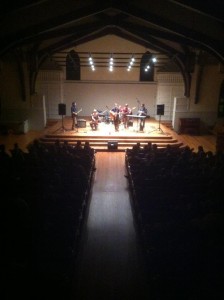As a lover of music and a firm believer in music’s ability to unite and inspire, I write about it quite a bit. For me, music braids a perfume of the divine into my everyday. Everyday life at The Haven is not exactly “easy.” Days can be crisis-filled, emotionally draining, or busy with mitigating conflict and unease. Yet, among these tremulous hours, joy is born in our community. This week I witnessed something extraordinary in the sanctuary. The transcendent moment I witnessed was a blessing of memory—a reminder that among human hardship there are constant moments of human brilliance.
The Haven sanctuary is usually empty in the afternoon, after sleepy morning-dwellers leave and business for the day picks up around the building. I heard music playing from the office space on the fourth floor, and went down to investigate the sounds coming from the sanctuary. It was a young man in a red t-shirt and black basketball shorts playing the piano. Slightly out of tune, the piano still produces equal amounts of melancholy and joyful tunes. He had taken off one shoe to better use the pedals. The young man was playing a very passionate piece full of chromatic chord progressions and rising crescendos. Fascinated, I sat quietly in the back of the sanctuary and listened to him play, enjoying the late afternoon light filtering through the stained glass windows.

The Haven sanctuary is used for public concerts, like this performance by The Nettles. As I have learned, it can also be a space for personal creation.
At the end of the song, I gently applauded and he turned around, startled: “Geez, where did you come from?” He bolted from the piano bench towards the water fountain, but returned to introduce himself as “S.” Another guest, Mr. F., came up the stairs and asked S. to keep playing. The two of us returned to the pews and respectfully took our front row seats next to the piano. At a close vantage point, I realized with incredulity, that S. was playing only with the three middle fingers of each hand. He had clearly taught himself to play, as no piano teacher would allow a student to play with only six fingers. It became clear that he had also written the song. After the second rendition, S. launched into a rapid fire pace explanation of where the song came from. He explained that he had needed to teach himself to play the piano in order to finish composing a song begun with a good friend, who had passed away last year. S. needed to finish writing the song in honor of this friend.
S. had the unmistakable air of someone with an intellectual disability. The pace of his speech was nearly unintelligible, and it was impossible to make eye contact. I’m not sure S. knew how much he had impressed me with his performance. All day, I raved about this young man’s seemingly genius ability to teach himself a new instrument merely to compose with it. The apparent barrier of an intellectual disability was not a barrier at all, but an obvious revelation of God’s mysterious presence in every day’s reality.
In a parable on handing over a fugitive to the enemy Henri Nouwen quotes: “But don’t you know that you have handed over the Messiah?” “How could I know?” the minister replied anxiously. Then the angel said: “If, instead of reading your Bible, you had visited this young man just once and looked into his eyes, you would have known” (The Wounded Healer, 26). Nouwen’s reflective, instructive book adamantly teaches that it is impossible to know the secrets of another person’s life until you slow down and concentrate on creating individual relationships. It should not be a mystery that every human life is complex and surprising, but it can be easy to lose track of that micro scale when facing such a sweeping issue as homelessness. It is all too easy to concentrate on the policies, the reform, and the operating life of the Haven. Even on the main floor in the Day Haven space, days can fall into a routine of familiar faces and familiar needs. This experience with S. has taught me to remain open to the miracles of human life happening every day.
Henri Nouwen also writes, “the God within can not only be a source of a new creative life but also the source of a chaotic confusion” (37). I cannot claim to know the intricacies of S.’s mind, but the crafted music he produces seem to indicate a wrestling of a confusing reality into a creative offering. He said he wrote the piece to preserve the legacy of a friend and mentor. I can only imagine the depth of the bond and friendship that inspired S. to learn an entirely new instrument in order to process and honor his friend’s life and death. Life among the poor does not mean a poverty of love and hope. S. was not playing for an audience; he was playing for himself. The contemplative ability of music to quiet the soul and comfort in times of loss was apparent and strikingly glorious. Within the Haven’s bustling world, a young soul creates his own space of calm.
In his guidance on becoming a contemplative leader, Nouwen asks the future Christian leader to “look for signs of hope and promise in the situation in which he finds himself” (45). There is hope in the boy playing his passionate, fervent music. In every individual life, there is revelation of wonder and peace.
